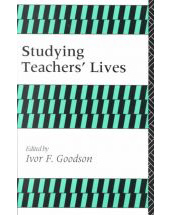Studying Teachers' Lives
Studying Teachers' Lives - problems and possibilities
In the chapter by Measor and Sikes we see them moving towards a more collaborative mode as they search for a solution to the methodological and ethical dilemmas involved in studying teachers' lives.
We would also like to suggest that working in a research team has some advantages here. We have explained elsewhere how the bias one individual had about an issue could be balanced by the others. We worked toward a notion of team triangulation, to guard against selection oversight, but it may be that this needs to be explored more rigorously if we are to build in proper safeguards to ensure that any theory generated is truly grounded theory (see p. 224).
Richard Butt and his colleagues have developed a multi-layered collaborative mode for their studies of teachers' lives. They judge that through a variety of different kinds of collaboration the teacher's life can be recounted in ways that seek to minimize 'the fallibility of memory, selective recall, repression, the shaping of stories according to dispositions, internal idealization and nostalgia'. Their methodological reflection on pages 62-4 and 91-4 make, I think, stimulating reading; above all inducing us to judge how more collaborative work does make us confront ethical and methodological issues head on and in the open. There is no method which can suspend ethical and methodological issues. There are just methods which obscure and mystify such issues (behind, for instance, claims of scientific and objectivist nature) or methods which honestly confront and openly wrestle with such issues. Collaborative work on teachers' lives is of the latter sort and this provides a major argument in favour of such work. This is especially the case if our agenda is partially to open up the sociological endeavour and the sociological imagination to teachers as they reflect about their lives.
The close collaborative mode particularly favoured by Butt et al., Casey and Measor and Sikes leads to a wide exposure of self and of the existential identity. As Nelson comments 'many women define being a teacher as a fundamental existential identity'. But moving into existential questions moves the research closer to questions of psychology and, indeed, psychoanalysis. This intersection is an important sub-text in a number of the papers. As Lou Smith et al. conclude, beyond technical, political and cultural processes 'there are personality processes at work as well' or, as Measor and Sikes state, 'if we are discussing the role that past experience comes to play in the construction of "a life" then it is difficult to work without making reference to work done in the field of psychoanalysis'.
